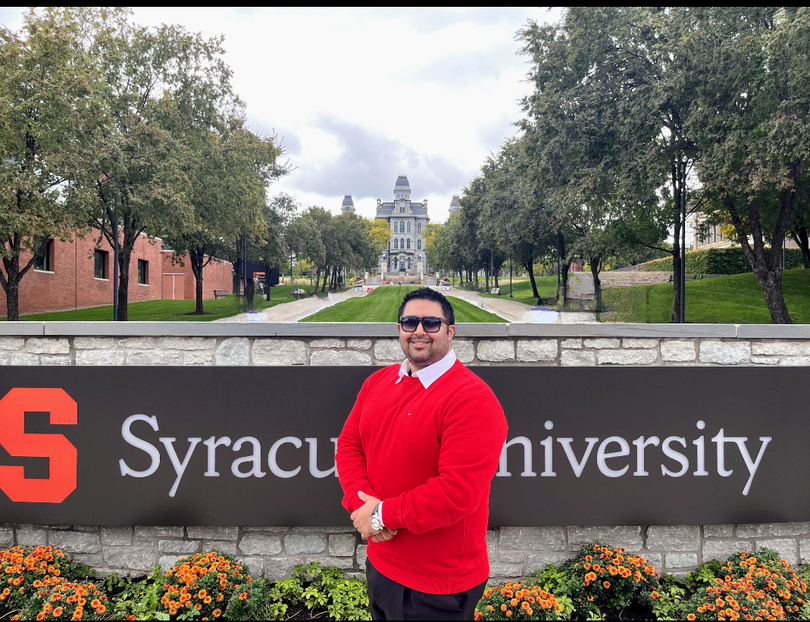Myths surrounding veteran students need to be deconstructed

Courtesy of Raul Rosique Jr.
Transferring to SU was an easy decision for student veteran Raul Rosique, as SU welcomes its students and gives them opportunities to share their experiences.
To support student journalism and the content you love, become a member of The Daily Orange today.
When I separated from the Navy, I was thrilled to start my higher education. When it was time for me to transfer, I knew I wanted to attend a university with a rich history of helping the nation and supporting veterans through their transition process.
After watching the movie “The Express,” Syracuse University was on my radar. I read more about this institution and immediately knew I wanted to attend. I did not know how impactful the veteran resources would be here, but I knew it would significantly alter my transition into the civilian world in a positive way.
But I began to notice that my peers were nervous to ask me questions pertaining to what I did in service. They heard myths about how it was rude to ask veterans questions, which is false in most cases.
While becoming more involved with SU’s Veteran Organization, I participated in panels and conversations that were never offered at my previous community college. I had the privilege of sitting on a panel at the Student Veterans of America National Conference in Florida earlier this year. Linda Euto, the associate director of research and evaluation at the Institute of Veterans and Military Families, asked me to be on a panel that debunks myths about student veterans.
During the panel, we discussed the common myths for those in our community, like veterans having a limited skill set and pursuing careers similar to their military specialization. From my personal experience, the first part of this statement is completely false.
During my time in the Navy, I learned a plethora of skills that I still use today. While on a nuclear submarine, I learned the typical military agendas. I also learned how to work in a group, assign tasks based on skill set, speak to crowds and handle high stress situations. These subset of skills that I learned in the military are extremely useful when working on group projects for class.
While I am not driving a submarine anymore and worried about my actions in case we begin losing power, I’ve had to use these same skills in different settings.Raul Rosique Jr., Secretary of Student Veteran Organization
The second part of the myth, from my experience, does have some truth to it. Typically, veterans who do more than twenty years in the military tend to do similar jobs when they discharge, which by no means is a bad thing. These service members are experts in their craft, so they lean towards what they know best.
However, veterans are not only sticking to what they know and to those in their field — this is being proven everyday on campus with the student veteran population rapidly increasing. Traditional students and veterans are working together more and more every year. Student veterans are integrating and leading more clubs and organizations on campus and are slowly proving we can be an asset here.
A prime example of this is the Barbell club on campus. A fellow student, veteran Freddy Bevacqua, who flew on P-3 Orion aircrafts and went through rigorous military training, essentially resurrected the Barbell club to a widely welcoming and recognized club on campus.
The club was having issues since their absence during the pandemic. He had no prior experience working with college clubs but the skill set he mastered while in service helped many students reach their fitness goals and meet new friends.
Another myth we discussed is that veterans are not creative, innovative or entrepreneurial. This entire statement is false. On a daily basis, many of my peers had to think efficiently and differently in high stress situations to complete the mission at hand.
While I am not driving a submarine anymore and worried about my actions in case we begin losing power, I’ve had to use these same skills in different settings. For example, this past semester my group had to put on a fictional ten-minute business pitch where I had to efficiently think differently to put on the best presentation possible.
While my group had an hour to prepare versus a few minutes to react to an immediate task in deployment, the mindset I had was the same. The last part of that myth — veterans are not entrepreneurs — could not be further from the truth. This is a prime example of why SU is the best place for veterans.
At SU, the IVMF helps all veterans achieve their professional and business-related goals. This amazing program offered to us can help us start and scale our veteran owned businesses. The entrepreneurial department at the IVMF is consistently used and has helped countless veterans. This department is only one sector of the IVMF program that was founded by SU’s Vice Chancellor Mike Haynie.
Looking back, my decision to transfer to this university has been one of the best decisions of my life. With all the resources offered, SU has made student veterans feel comfortable and belonged.
My experience at SU has made me thrilled about my decision to separate from the military and show the civilian sector what I can do with my combination of military training and education from this prestigious institution and add to the community with my peers.
Raul Rosique Jr. is a Health and Exercise Science (Pre-P.T.) major and the Secretary for SU’s Student Veteran Organization. He can be reached at rrosique@g.syr.edu.





